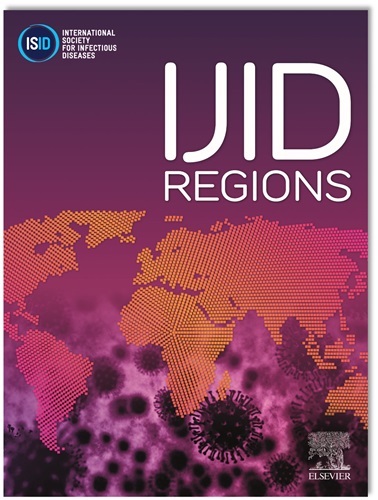Exploring challenges in implementing antimicrobial stewardship interventions across eight African nations: A multi case study
IF 4.8
2区 医学
Q1 INFECTIOUS DISEASES
引用次数: 0
Abstract
Introduction
The Commonwealth Partnerships for Antimicrobial Stewardship (CwPAMS) programme, funded by the UK Department of Health and Social Care's Fleming Fund and managed by the Commonwealth Pharmacists Association (CPA) and Tropical Health and Education trust (THET), currently supports 24 health partnerships (HPs) developing and implementing antimicrobial stewardship (AMS) interventions in 73 health facilities across eight African countries: Ghana, Kenya, Malawi, Nigeria, Sierra Leone, Tanzania, Uganda, and Zambia. This study assesses the barriers and challenges experienced by HPs in designing and implementing AMS interventions.
Method
A qualitative case-study design was adopted, with data collection undertaken between June 2023 and March 2024 by in-person (THET and CPA) visits. Data collection methods included non-participant observations, formal and informal feedback from key stakeholders, semi-structured interviews and focus groups. Interview guides were designed based on the Consolidated Framework for Implementation Research to encourage systematic data collection and reporting, track progress and identify barriers encountered during implementation of AMS interventions. Qualitative data underwent thematic analysis using NVivo 14®.
Results
Since the introduction of CwPAMS, a total of 15 AMS committees, 52 Point Prevalence Surveys (PPS) on antimicrobial use, and 21 AMS action plans have been developed and established across 73 health facilities, with 884 healthcare professionals completing AMS training. Key barriers reported by HPs included: challenges in PPS data collection due to lack, or inadequacy, of electronic patient record systems; delays in permissions and approvals (e.g. ethical approval); competing priorities (e.g. institutional priorities vs quality improvement initiatives); limited funding; challenges with procurement of medicines/reagents; over-ambitious projects as well as monitoring and evaluation plans. Health facilities also reported obstacles in antibiogram development due to inadequate sample sizes, secondary to limited access to diagnostics, reagents and consumables. HPs reported issues such as inconsistent access to running water, costly laboratory reagents with short expiry dates, staff shortages, and antibiotic stockouts. Reluctance to behavior change (especially prescribing practices), as well as time required for behavior change while implementing AMS interventions, were also commonly cited as barriers by HPs.
Discussion
Buy-in from multiple stakeholders across all levels and scope of practices have facilitated change management and supported implementation of AMS interventions. In addition, realignment of project plans when and where needed, as well as efforts to secure additional funding and resources are underway to address the challenges identified.
Conclusion
Multi-case study analyses informed the customization of interventions and the development of real-time data driven strategies to address implementation obstacles, thereby facilitating the adoption, integration and uptake of AMS interventions within respective health facilities which, in due course, lead to desired outcomes.
探索在八个非洲国家实施抗菌剂管理干预措施的挑战:多案例研究
英联邦抗菌剂管理伙伴关系(CwPAMS)规划由联合王国卫生和社会保健部弗莱明基金资助,由英联邦药剂师协会(CPA)和热带健康与教育信托基金(THET)管理,目前支持24个卫生伙伴关系(HPs)在8个非洲国家的73个卫生设施中制定和实施抗菌剂管理干预措施。加纳、肯尼亚、马拉维、尼日利亚、塞拉利昂、坦桑尼亚、乌干达和赞比亚。本研究评估了保健医生在设计和实施辅助医疗干预措施时遇到的障碍和挑战。方法采用定性案例研究设计,在2023年6月至2024年3月期间,通过面对面(THET和CPA)访问进行数据收集。数据收集方法包括非参与者观察、主要利益相关者的正式和非正式反馈、半结构化访谈和焦点小组。访谈指南是根据实施研究综合框架设计的,目的是鼓励系统地收集和报告数据,跟踪进展情况,并确定在实施辅助医疗服务干预措施期间遇到的障碍。使用NVivo 14®对定性数据进行专题分析。结果自实施该计划以来,73家卫生机构共建立了15个辅助医疗服务委员会、52项抗微生物药物使用点流行调查(PPS)和21项辅助医疗服务行动计划,884名卫生保健专业人员完成了辅助医疗服务培训。卫生保健提供者报告的主要障碍包括:由于缺乏或不充分的电子病历系统,在卫生保健提供者数据收集方面存在挑战;许可和审批的延迟(例如道德审批);相互竞争的优先事项(例如机构优先事项与质量改善措施);有限的资助;药品/试剂采购方面的挑战;过于雄心勃勃的项目以及监测和评估计划。卫生机构还报告说,由于样本量不足,再加上获得诊断、试剂和消耗品的机会有限,在制定抗生素谱方面存在障碍。卫生保健工作者报告了一些问题,如不稳定的自来水供应、有效期短的昂贵实验室试剂、人员短缺和抗生素短缺。不愿改变行为(尤其是处方做法),以及在实施辅助医疗系统干预措施时改变行为所需的时间,也是卫生保健工作者经常提到的障碍。讨论来自各个层面和实践范围的多个利益相关者的支持促进了变革管理并支持了辅助医疗系统干预措施的实施。此外,在需要的时间和地点重新调整项目计划,并努力确保额外的资金和资源,以应对所确定的挑战。结论多案例研究分析为干预措施的定制和实时数据驱动战略的制定提供了信息,以解决实施障碍,从而促进各自卫生机构采用、整合和采用辅助医疗系统干预措施,并在适当的时候产生预期的结果。
本文章由计算机程序翻译,如有差异,请以英文原文为准。
求助全文
约1分钟内获得全文
求助全文
来源期刊
CiteScore
18.90
自引率
2.40%
发文量
1020
审稿时长
30 days
期刊介绍:
International Journal of Infectious Diseases (IJID)
Publisher: International Society for Infectious Diseases
Publication Frequency: Monthly
Type: Peer-reviewed, Open Access
Scope:
Publishes original clinical and laboratory-based research.
Reports clinical trials, reviews, and some case reports.
Focuses on epidemiology, clinical diagnosis, treatment, and control of infectious diseases.
Emphasizes diseases common in under-resourced countries.

 求助内容:
求助内容: 应助结果提醒方式:
应助结果提醒方式:


